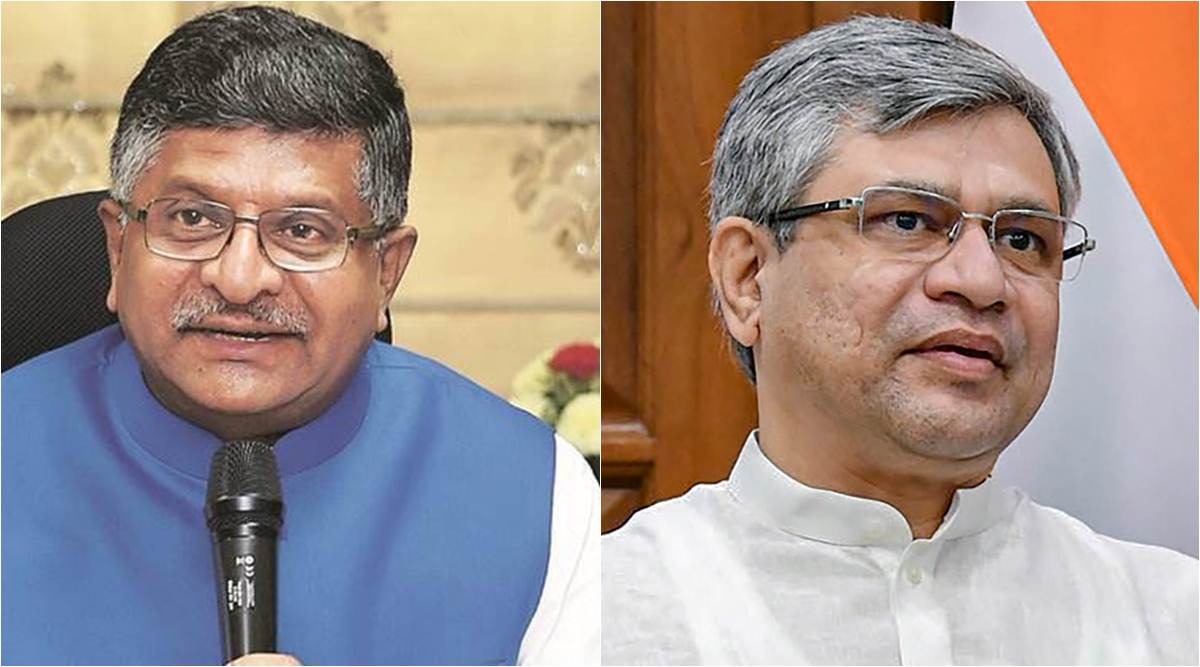 Ashwini Vaishnaw (R), also gets the Railways portfolio.
Ashwini Vaishnaw (R), also gets the Railways portfolio. FORMER IAS officer, alumnus of IIT-Kanpur and Wharton Business School, entrepreneur, Rajya Sabha MP from Odisha. Meet Ashwini Vaishnaw, who has taken over as the new Union Minister for Communications, Electronics and Information Technology, and Railways.
Born in Jodhpur in 1970, Vaishnaw served as District Collector in Balasore and Cuttack, and played a key role in rehabilitation efforts following the devastating super cyclone in 1999. He also worked in the Prime Minister’s Office when the late A B Vajpayee was at the helm — and was appointed as Vajpayee’s private secretary after the NDA’s loss in 2004.
Vaishnaw went on to complete his MBA in 2008 and became the managing director of GE Transportation, and vice-president of Locomotives and head of Urban Infrastructure Strategy at Siemens.
In 2012, he set up two automotive components manufacturing units in Gujarat, namely Three Tee Auto Logistics and Vee Gee Auto Components. In 2019, he joined the BJP and became a Rajya Sabha MP with support from the BJD.
Taking to Twitter Wednesday, Vaishnaw thanked Prime Minister Narendra Modi “for giving me the opportunity to serve the nation as Union Minister”. He also posted that he “will take charge tomorrow and work relentlessly” to realise the Prime Minister’s vision. “I seek the choicest blessings of Lord Jagannath to serve the people of Odisha,” he posted.
While Vaishnaw takes over the Rail Ministry from Piyush Goyal, who remains in the Cabinet, his entry into Telecom and IT in place of Ravi Shankar Prasad, who resigned Wednesday, comes amid a high-profile tussle between the Government and tech giants Twitter and Facebook-owned WhatsApp — from the new IT rules to the fallout of police searches at Twitter’s offices over the alleged “Congress toolkit”.
Prasad had been in the eye of the storm ever since the tussle flared up on January 31 when the IT Ministry issued a notice to Twitter asking it to block public access to 257 accounts in India.
These accounts, the IT Ministry said, had been “spreading misinformation” about the farmers’ protests, which had the potential to “lead to imminent violence affecting public order situation in the country”.
A week later, a fresh list of more than 1,150 accounts was sent to Twitter, again with a request to block their access in India. Twitter initially refused, but soon sought “a formal dialogue”, saying that the safety of its employees was top priority. But after a two-hour-long meeting with Twitter executives on February 10, Prasad’s Ministry expressed “strong displeasure” on “differential treatment” to complaints raised by the Government.
The spat was not limited to just Twitter. Following the February announcement of new IT Rules, which prescribed guidelines for social media intermediaries as well as digital news channels, the Ministry attacked the tech firms for being “defiant”.
Defending the rules, Prasad told The Indian Express in March that the Government would no longer accept “Internet imperialism” by a “select few” and will ensure that they respect local ideas, culture, traditions and sentiments.
In May, the ruling BJP alleged that the Congress had created an online “toolkit” with instructions to its social media influencers and party strategists on how to “corner the Modi government and various BJP governments in the country” over the Covid situation.
With the Congress saying the document was “forged”, police conducted searches at the offices of Twitter, which described the action as “intimidation tactics” and a “potential threat” to free speech, both fiercely denied by Prasad.
Later that month, Facebook-owned WhatsApp approached the Delhi High Court saying that the IT Ministry’s norms on the identification of the first originator of information would mean breaking end-to-end encryption. Prasad responded that India is not the only country seeking a regulatory mechanism to access “limited” data from end-to-end encrypted instant messaging platforms to detect and prevent crime.
The face-off came to a head on June 25 when Prasad said he was locked out of his official Twitter account for over an hour after the microblogging platform allegedly received a notice of violation of American copyright law by his account.
Last year, Prasad’s Telecom Ministry became the face of the Government’s response to China’s border aggression. On June 29, 2020, the Ministry banned as many as 59 apps that either had ‘Chinese’ ownership or had some links to China.
These apps, the ministry had then said, were engaged in activities “prejudicial to sovereignty and integrity”, defence, security and public order. The move was seen as a retaliatory step amid the tense border standoff between India and China that led to 20 Indian Army personnel being killed on June 15, 2020.
Prasad’s other portfolio of Law, too, had its fair share of controversies, but mostly in the first term. His first task, after appointment as Law Minister in 2014, was the ambitious overhaul of judicial appointments through the National Judicial Appointments Commission. But this led to an unprecedented standoff that stalled the appointment of judges for over two years.
In October 2015, the Supreme Court struck down the NJAC as unconstitutional. Despite the ruling, Prasad insisted that the Government was an equal stakeholder in the process of appointing judges.
In 2018, the Law Ministry raised objections over the elevation of Justice KM Joseph citing issues of seniority and regional representation. Justice Joseph had, as chief justice of the Uttarakhand High Court, struck down the Centre’s order to impose President’s rule in 2016. Eventually, the Ministry yielded to the collegium’s recommendation.
On the legislative front, Prasad introduced the Muslim Women (Protection of Rights of Marriage) Act, 2019 that criminalised instant triple talaq in the Parliament. The law was stalled in the Rajya Sabha twice and was eventually passed in 2019.
- The Indian Express website has been rated GREEN for its credibility and trustworthiness by Newsguard, a global service that rates news sources for their journalistic standards.

